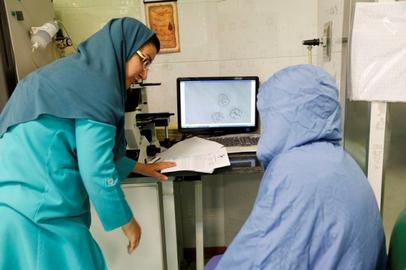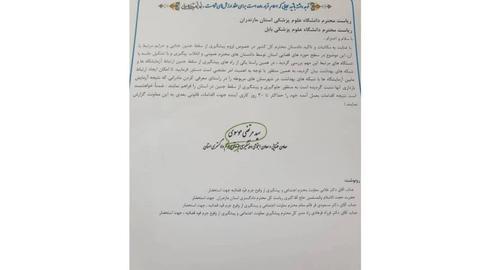Doctors and activists have expressed alarm at a recent announcement that the names of all pregnant women in Iran will be added to an online registry from the moment they return a positive test.
On July 16, Saber Jabberi, head of the Health Ministry’s Youth Population Department, told the state-aligned Iranian Students News Agency (ISNA) that the Ministry had begun testing its new “Comprehensive Pregnancy Registration System”. Any woman who attends a medical center for a pregnancy test or sonogram, he said, would be added to the database.
He emphasized again that as has been the case in Iran for decades, elective abortion is a crime. This has recently been extended to members of the medical profession that offer it. “According to the new law [the "Law on Family Protection and Youth"],” he said, “aiding and abetting abortion is a crime, and the violator faces penalties. If a doctor is involved, he will be disbarred, even if he contributes to an abortion-by-choice just once.”
The development comes amid a welter of recent assaults on reproductive rights in Iran, aimed at realizing Supreme Leader Ali Khamenei’s long-standing demand that the birth rate increase. On July 19, the newspaper Ham Mihan reported that female Health Ministry agents had been deployed to a number of hospital wards on so-called “pregnancy patrols”, with permission to intervene and try to talk women out of planned surgeries that might affect their fertility.
The ‘Comprehensive Pregnancy Registration System’: What We Know So Far
A gynaecologist based in Iran, who asked to be identified only as N., told IranWire the system had yet to be rolled out in their city. “As yet, they haven’t given us any instructions or training in how to use it. But from what I understand, it’s a new system for recording the patient’s medical information so it will all be in digital format.
“Up until now, when a patient came to us, we’d provide a pregnancy test and sonogram. She would take the test and see the result for herself, and if she wanted to stay pregnant, she could come back to us and schedule regular visits. If she didn’t – there are lots of ways to get an abortion. Including a pill she could easily buy on the internet.”
By creating an integrated digital system, N. said, “They want to turn doctors into the enactors of official medical guidelines. This isn’t something I agree with; medicine isn’t always about following the guidelines to the letter. They often override the doctor’s own experience and expertise.”
On the flipside, they said, it could make it simpler for women to pursue a legal avenue for abortion: with all the information in one place, “if necessary, she can go to the courts for an abortion permit.”
A Multitude of Risks
The women’s rights activist Shiva Nazar Ahari is one of many observers who were left deeply worried by the latest announcement. “This is a cause for extreme concern,” she told IranWire, “because it’s part of the Law on Family Protection and Youth, which aims to increase the population at any cost.
“The law has two aspects: motivational and punitive. The former is comparatively miniscule. And in the context of this law, it’s clear the pregnancy registration system is not intended to provide for pregnant women. It’s a tool to monitor and control them, and to deter them from terminating unwanted pregnancies.
“The government justifies this system by claiming that it can provide women with the treatment they need by logging all their information.” But in context, she said, it means “the moment the system learns a woman is pregnant she will be under surveillance. If she doesn’t want it, she’ll have to answer to the authorities, and [if she aborts] she will have to prove there was a miscarriage. If she can’t, she will have to suffer the consequences.”
In serious cases, Nazar Ahari fears, this “deterrent” could cost a pregnant woman her life. A woman might feel forced to carry a baby to term where it poses a risk to her health, or else – given the often porous nature of official information systems in Iran, and the ever-present problem of bribery-corruption – the information could reach hostile third parties.
“Any woman who gets pregnant outside of marriage is in real danger,” she said. “With her name registered on a system like this, she can’t end the pregnancy without others knowing about it. And her family could learn about it. It could lead to her being treated violently or even becoming the victim of an honor killing.”
The likely outcome, she says, is that many women will eschew important medical appointments if they suspect they could be pregnant. “Women who might want a sonogram but don’t want their names to be recorded in a database can’t access this service. They will have to ‘go underground’ from start to finish, and off-books medical services can be risky.” They are also expensive, she added: “Not everyone can afford even these unregulated services, which means yet more inequality and yet more social injustice.”
visit the accountability section
In this section of Iran Wire, you can contact the officials and launch your campaign for various problems
























comments